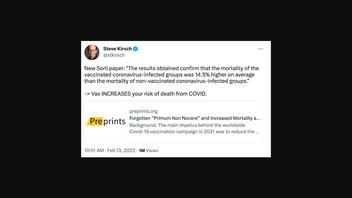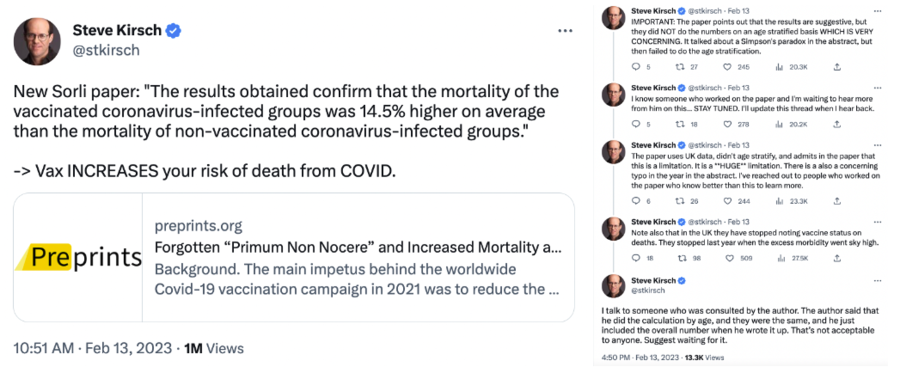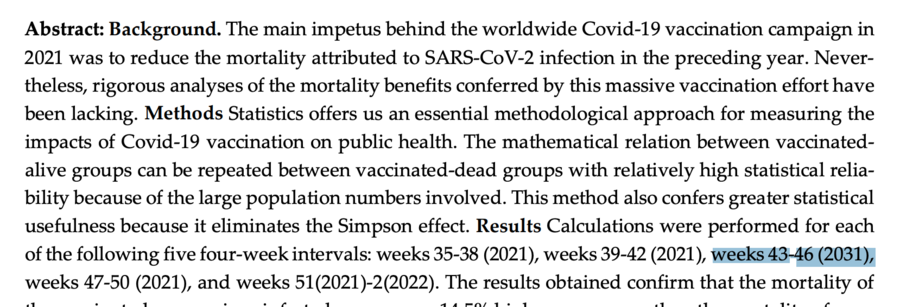
Did a research paper adequately demonstrate that vaccinated COVID-19 patients die at a higher rate than their unvaccinated counterparts? No, that's not true: The study in question has limitations that affect the quality of its conclusions. Furthermore, the study is published in a preprint journal and as of this writing has not been critiqued by scientific experts familiar with the topic, which is how new findings are tested for validity. An infectious disease expert told Lead Stories that the paper in question "is a pseudoscientific effort to misinform people inclined to disbelieve or not able to discern fact from fiction."
The claim originated in a paper published on the preprint server Preprints.org. The findings of the study were then shared in a thread posted to Twitter on February 13, 2023, by Steve Kirsch, a COVID misinformation spreader who Lead Stories has previously fact checked. The post read:
New Sorli paper: 'The results obtained confirm that the mortality of the vaccinated coronavirus-infected groups was 14.5% higher on average than the mortality of non-vaccinated coronavirus-infected groups.'
-> Vax INCREASES your risk of death from COVID.
Below is how the thread appeared on Twitter at the time of writing:
 (Source: Twitter screenshot compilation taken February 15 10:26:36 2023 UTC)
(Source: Twitter screenshot compilation taken February 15 10:26:36 2023 UTC)
Dr. Richard Novak, professor and head of the division of infectious disease at the University of Illinois, Chicago College of Medicine, told Lead Stories in an email received February 17, 2023, that the paper "is a pseudoscientific effort to misinform people inclined to disbelieve or not able to discern fact from fiction."
A preprint study means the research has not been vetted, reviewed by scientific peers
First, the most recent version of the study, a preprint paper, means that the research had not been reviewed by scientific experts in the subject matter nor had it been published in a reputable scientific journal. Anyone can publish to a preprint server.
As part of a peer-review process, formatting and typographic errors exhibited in the paper -- including the use of "2031" in the abstract rather than the year "2021" -- would typically be corrected. Experts would also assess the research methods, the mathematical analysis and the logic of the conclusions drawn. Because this study has not undergone the rigorous peer review process, such errors have not been captured and were present in the study as of this publication:
(Source: Instagram screenshot taken Fri Feb 17 22:37:41 2023 UTC)
Authors did not control for elderly or immunocompromised groups
The paper's authors did not account for age or other consequential health variables. This suggests that the data is skewed, as individuals who received COVID vaccines first were typically either elderly or immunocompromised, meaning they were already at a higher risk of death overall. Kirsch himself said that such lack of controls is "unacceptable," and Novak agreed.
No further information was provided as to how the paper authors controlled for external variables of subjects included in the analysis, such as lifestyle, previous or current health conditions, and their demographic data, including age, ethnicity, race, sex and geographic location.
"The equations [the researchers] use do not appear to be logically derived, so conclusions based on these are suspect," Novak told Lead Stories. "[The researchers] look at overall mortality in subpopulations, without determining what the cause of mortality is. This is, if anything, a retrospective review of public health data and not a controlled clinical trial."
Data not available for review and includes vaccines specific to the UK
As we have previously reported, to be considered scientifically sound, researchers must be transparent with the data they collect and study. As part of the study in question, the authors simply cited "UK HEALTH AGENCY" and "UK Health Security Agency" as the official data source and included a general link to the U.K. real-time data on the effectiveness and impact of COVID vaccines. However, the specific datasets used were not included in the study. In credible research, the data are combed over by experts and calculations are checked.
Additionally, the authors did not differentiate between the types of vaccine analyzed nor did they specify whether such a vaccine was an initial dose or subsequent booster.
"The source of their data is unclear, other than it is from the U.K., where the predominant vaccine was the ChadOx," Novak said.
As such, potential conclusions are not necessarily relevant to other vaccines available on the market.
Novak added that many of the adverse health outcomes cited in the paper, such as thromboembolism or stroke, are known but rare consequences of COVID.
Paper findings were overgeneralized
The study authors generalize their findings to populations beyond England, but do not statistically demonstrate how they figured their findings were relevant to other populations, where the age mix, overall health, type of vaccine and public health measures can differ widely.
Other Lead Stories fact checks about COVID can be found here.


















